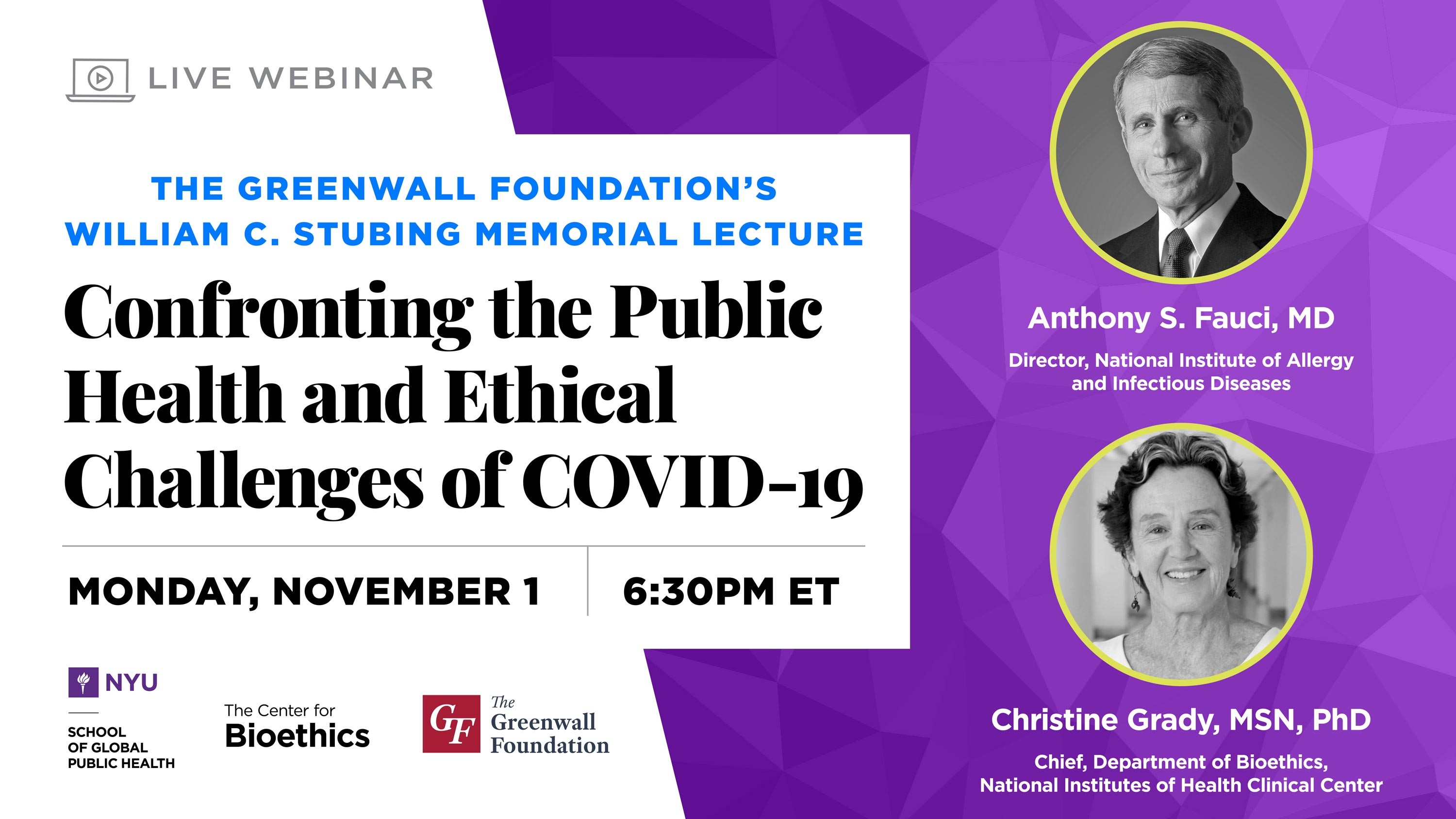The Greenwall Foundation’s 2021 William C.
Stubing Memorial Lecture, Confronting the Public Health and Ethical
Challenges of COVID-19, drew more than 650 participants to an evening of
discussion featuring the public health duo leading the fight against COVID-19,
Dr. Anthony Fauci and Dr. Christine Grady. The virtual Lecture was moderated by
CNN’s Chief Medical Correspondent, Dr. Sanjay Gupta, and produced in
partnership with the NYU School of Global Public Health and its Center for
Bioethics.
Drs. Fauci and Grady, who married in 1985, made
a rare appearance together to discuss current events and their storied careers
on the front lines of public health. Dr. Grady, a Greenwall Foundation Faculty Scholars
Program Committee Member, is Chief of the Department of Bioethics at the
National Institutes of Health Clinical Center. Dr. Fauci is Director of the
National Institute of Allergy and Infectious Diseases.
The wide-ranging discussion touched on trust in science, how decision-makers
should approach misinformation and divisiveness, and reasons to be optimistic
in the face of the pandemic. Dr. Gupta began the conversation by broaching the
topic of public health and how it relates to the individual and society at
large. “So much of what we ask people to do when it comes to a pandemic like
this, and public health, is not only [to] do things for themselves but [to] do
things for the collective,” he said.
“There’s a classic tension between public health and individual
interests and freedoms,” said Dr. Grady. “There are principles to public health
ethics that help you sort out the kinds of interventions we should use…things
that are effective, that are proportional, where the benefits outweigh the
risks, that are necessary, [with] the least infringement possible and are transparent,
that we can publicly justify.”
She added, “The challenge has been that some people view those public
health requests as more than a sort of minor infringement on their rights and
freedoms.”
Having navigated multiple outbreaks over the
last 40 years, Dr. Fauci said the current pushback on public health measures is
unlike public responses he has seen before. He remarked that resistance to masking
has become about political expression more than rights infringement. He emphasized
that “the enemy is the virus. The enemy is not someone who disagrees with what
I want to do.”
Despite today’s divisive atmosphere, Dr. Fauci said he remains
a “cautious optimist.” “I have to believe…that ultimately the better angels
will return as dominant force…and that we will return to a much more
considerate approach towards the rest of the world.”
Dr. Gupta asked Dr. Fauci and Dr. Grady if they
thought people expected a “certainty” in science, and how that perception has
affected the pandemic response. Dr. Fauci said that “science is
self-correcting. Science is seeking the truth, data, and evidence.”
“The public has paid more attention to science
during this pandemic than maybe most other times,” said Dr. Grady. “[What]
comes with knowing about science and paying attention to science [is] a
realization of how messy science can be, how uncertain it can be, and how
things do change over time.”
Dr. Grady acknowledged
there are reasons beyond misinformation why trust has diminished. “Trust was
tested because it appeared we weren’t as prepared for the pandemic as we should
have been,” she said. In the beginning “there [were] a lot of chaotic
responses” with testing, PPE, a loss of public health infrastructure, and conflicting
messages from the Federal government.
Dr. Fauci added, “There was mixed messaging
that really whiplashed a lot of people…When the leader of the country said ‘it
will go away like magic’…and then you have public health leaders like myself
saying, ‘we really have a problem here—it’s going to get worse.’”
Talking about how experts can best communicate
policy, Dr. Fauci said the 1980s AIDS crisis showed him how important it is to pay
attention to the needs of people who are impacted by public health policies. “The
[AIDS] activists taught me, ‘OK, you have the science, you’re making the policy— but I’m the one who’s at risk, who is sick and dying. You can’t
ignore the impact of your policy on me.’”
Asked about whether we will be living with
COVID-19 long-term, Dr. Fauci said, “I hope that we get low enough in the
endemicity that it really doesn’t impact you in the sense of interfering with
the normal things we like to do. I don’t think we are going to eliminate
[COVID-19].”
Despite the pressure on public health leaders
today, the pair said they loved their careers and encouraged students to pursue
public health and bioethics.
“Bioethics is an intellectually rigorous and
exciting place to be,” said Dr. Grady.
“I would do it for nothing,” added Dr. Fauci.
About
the William C. Stubing Memorial Lecture
William C. Stubing served as President of The Greenwall Foundation for 21
years. In 2016, the Foundation established the William C. Stubing Memorial
Lecture in honor of its beloved former President, who guided the Foundation to
its current focus on bioethics.
Previous Lectures have covered timely topics in
bioethics: the history of prejudice in pandemics, genome editing, physician aid-in-dying, and drug pricing. Past speakers are
Pulitzer Prize winner, Dr. Siddhartha Mukherjee, University of Pennsylvania
President, Dr. Amy Gutmann, and former White House health policy advisor, Dr.
Ezekiel J. Emanuel.
